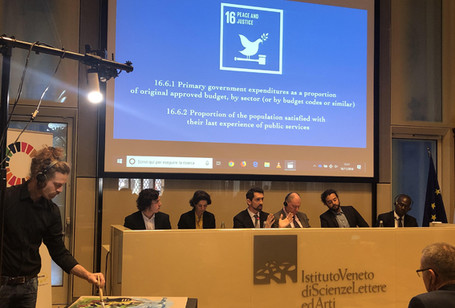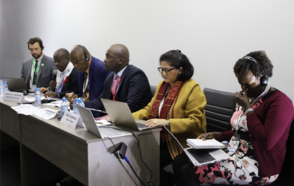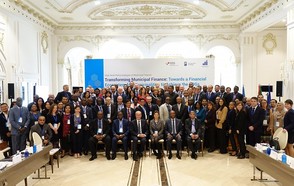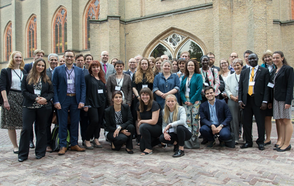
On November 16, 2018, Local, metropolitan and regional governments as well as representatives of national governments, UN agencies and Development banks gathered in Venice to identify and discuss the existing solutions to face the challenge of how to finance the implementation of the SDGs at local level.
UN-Habitat, UNCDF, UNDP, and UCLG, co-organised the Venice City Solutions 2030-Financing the SDGs at the local level. The Italian Association for the Council of European Municipalities (AICCRE) hosted the event which received financial support of Platforma and the United Nations Advisory Committee of Local Authorities (UNACLA). The event also counted with the technical contribution of FMDV. Four guiding issues were addressed. First, presenting some of the national strategies in place for financing the achievement of the SDGs at local level. Second, how local governments are making the Agenda 2030 a reality at local level. The third panel focused on measuring impact at local level through, notably, budget alignment and tracking indicators. Finally, the fourth panel discussed how to harness vibrant local economies to achieve the 2030 Agenda.
In her opening statement, Carla Rey, Secretary General of AICCRE, emphasized that such a multi-stakeholder setting contributed to finding co-responsible solutions for peace, justice and strong institutions. Frederic Vallier, Secretary General of the CEMR, stressed that the intensity of climatic phenomena constrains all stakeholders to learn and exchange solutions to transform our development models. Mahmoud Mohieldin, World Bank Group Senior Vice President for the 2030 Development Agenda, insisted on the need to have forward thinking policies and strategies, taking full advantage of devolution of powers on the one hand and matching the responsibilities with the necessary financing.
Emilia Saíz, Secretary General of UCLG, invited all participants to engage in the “hard talk”.
“The High level Political Forum is just a beauty contest if we don't talk about what is failing. Beyond financing, if 65% of the SDGs are linked to local governments we must re-thinking how local government can develop sound financial strategies and building partnerships at their level. The NUA, in particular, is a milestone in finding innovative ways to accelerate the localization of the SDGs.” said Emilia Saiz, Secretary General of UCLG.
Throughout the day, representatives from Amman, Cochabamba, Madrid, Montevideo, Tilarán, as well as the local government associations of Uganda, East Africa, France, Belgium, Netherlands and Italy made strong contributions to present the local initiatives that local governments are pro-actively leading. All highlighted the need to innovate in the way local public policies and development projects are financed. The issue of data, transparency and accountability was key to the discussions. In particular, local governments called for enhancing the way administrations report back to the citizens and harness the local knowledge of communities: citizens, they said, must benefit from the data they co-produce and trust between all levels of government must be reinforced.
Some flags were raised to recall that in most regions, including Europe, local governments associations are still raising awareness at the level of the local governments and building up local capacities to align local priorities with national strategies for sustainable development. Throughout the day, local governments called for caution in the way we understand “alignment” and making sure that all levels of government work in a coherent and co-responsible way. Development banks, in particular, were called upon to adopt different perspective to truly engage in partnership with local and regional governments based on the local capacities, solutions and priorities.
The all-day discussion made it clear that more multi-stakeholder dialogues were necessary to get the conversation going and make transformative steps forward in reaching a new social contract.
A set of recommendations was finally reached and will be brought to the next High Level Political Forum, in July 2019. These include, but are not limited to:
- Not only making sure that finance is commensurate with mandates at all levels of government, but innovating in the way that local and regional governments are able to finance their daily efforts. In this regard, international organizations should link funding and financing to concretizing decentralization and supporting reliable data collection and tailored indicators at the local level.
- All levels of government should improve the way they communicate and involve citizens in the local development processes. This is a matter of harnessing accountability requirements to build stronger bonds between the citizens’ and cities’ elected bodies and officials. In doing so, they would show their pro-active engagement towards sustainable development and building dynamic partnerships with civil society.
- Beyond formal recognition of the co-responsibility of local governments in achieving the global goals, it was highlighted that co-ownership is directly linked to having a seat and a say at the policy-making global and national tables. Coordination mechanisms for coherence of efforts and alignment between all stakeholders, including Parliament, are necessary.
On behalf of the Global Taskforce of Local and Regional Government, UCLG will facilitate the third report of Local and Regional Governments Towards the Localization of the SDGs.













